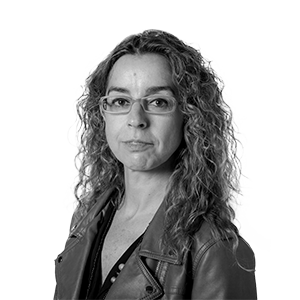Roya Sadat: “The world is going down the wrong path; cinema needs to serve to awaken people.”
Afghan film director


BarcelonaShe's a woman, Afghan, and a film director. The perfect combination for the Taliban to consider her. persona non grata After having sidelined women from public life and banned cinema in Afghanistan, Roya Sadat (Herat, 1983) is in Catalonia to present her latest film. Sima's song [Sima's song]. Also, this Monday, in the Asian Film Festival Barcelona His documentary will be screened The sharp edge of peace [The Sharp Edge of Peace], focusing on the only four Afghan women who participated in the peace talks between the Afghan government and the Taliban, which ended with the radicals taking Kabul.
Where were you when the Taliban came to Kabul?
— I was working in Seattle, in the United States. My husband and I had planned to stay for a few weeks, then continue filming in Doha, and finally travel to Kabul. But on our first day there, my sister sent me a video of the Taliban entering the city of Herat, and I was shocked. History was repeating itself, and we were losing everything: my film production company, Roya Film House...for which we had worked so hard. All the equipment, the materials, the files... I had with me the material from The sharp edge of peaceBecause the documentary's subject matter is very sensitive, and I had already planned to edit it outside of Afghanistan. But I didn't have any more. I regretted not having brought my entire archive out of there.
Were you able to recover it?
— No. My family tried to hide it, but they had to leave the country with the clothes on their backs. Some left in 2021 [when the Taliban came to power], but others much later. One of my sisters is still in Afghanistan, but I'd rather not say which city.
In other words, he had to start from scratch.
— Suddenly we had to obtain refugee status, we had difficulty traveling, and we had no income. My husband, who is an actor and cinematographer... The sharp edge of peace and co-writer of Sima's songHe started working as a cook. I'd like to mention his name. It's Aziz Deldar. Thanks to him, I was able to continue working on both productions.
Anyway, it wouldn't be easy.
— Nothing. We didn't have money for post-production, the four protagonists of the documentary and I were in exile, we couldn't travel, and I needed to follow them for the final interviews.
Why did he plan to edit the documentary outside of Afghanistan?
— Starting in 2021, the Taliban began carrying out targeted attacks. They killed a well-known journalist, an activist... And it was very easy for them to plant a magnetic bomb in the street. There's a scene in the documentary where you see women gathered in a Kabul cemetery: they're the mothers of students from a school that was bombed. The [government] Security Department contacted me to warn me not to go to the cemetery in my car. I went by taxi, with my face covered, to film the scene. If I edited the documentary in Afghanistan, I would have taken too many risks. Neither the Taliban nor the government wanted us to do it.
Not the Afghan government either?
— The government didn't want to give us accreditation to film [the peace talks]. We had to contact the European Union, the US embassy, Norway... to put pressure on them.
Why is the documentary so controversial?
— Because it shows that the peace discussed at a negotiating table is one thing, and reality is another. And the reality is that the bombings and suicide attacks continued... The people weren't part of those conversations; they had no voice.
Roll Sima's song Was it that complicated?
— I'm very happy because the film was produced by Alba Sotorra. She wanted to shoot it in Afghanistan, but security issues and the fact that I was in exile meant we ended up filming it in Athens. We edited it in Barcelona, and it was also very difficult to get a visa every time I came from the United States.
But it was worth it. The film won the audience award at the Invisible Cinema International Festival and received a special mention from the jury at the Som Cinema Festival in Lleida.
— I'm very happy, but even when I go up on stage to accept an award, I can't help but be serious. And I am because I know what's happening in Afghanistan and in so many other parts of the world. The world is on a very bad path. That's why we need to put all our efforts into making sure that cinema serves to awaken people.
